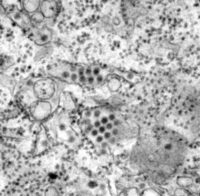16 Feb Genetic Pathways Determine Susceptibility to Dengue Shock Syndrome
MedicalResearch.com Interview with:

This transmission electron microscopic (TEM) image depicts a number of round, Dengue virus particles that were revealed in this tissue specimen. CDC image
Luisa Pereira PhD
Institute for Research and Innovation in Health
University of Porto
MedicalResearch.com: What is the background for this study? What are the main findings?
Response: By using admixture mapping along the genome in Thai cohorts, we were able to identify new candidate genes conferring protection/susceptibility to dengue fever. A very interesting result was that the set of genes differed with the dengue phenotype: genes coding proteins that may link to the virus, conditioning its entrance in the host cells and mobility therein were associated with the less severe phenotype; genes related with blood vessels permeability were associated with the dengue shock syndrome.
MedicalResearch.com: What should readers take away from your report?
Response: Another interesting result is that when checking frequencies of these variants in worldwide populations, it was possible to confirm that Northeast and Southeast Asian populations are very susceptible to both phenotypes, Africans are best protected against dengue shock syndrome and less so against dengue fever, while Europeans are best protected against dengue fever and the most susceptible against dengue shock syndrome. Please, have in mind that these are not the only genes conferring susceptibility to dengue disease, but they match well some epidemiological observations.
MedicalResearch.com: What recommendations do you have for future research as a result of this work?
Response: The statistical method we applied should be used in other cohorts in order to identify more gene candidates, which could help us to have a better grasp of the genetic factors conditioning this disease. The candidate genes that we identified must be analyzed through functional assays to confirm and characterize the molecular mechanism of action.
Citations:
Oliveira M, Lert-itthiporn W, Cavadas B, Fernandes V, Chuansumrit A, Anunciação O, et al. (2018) Joint ancestry and association test indicate two distinct pathogenic pathways involved in classical dengue fever and dengue shock syndrome. PLoS Negl Trop Dis 12(2): e0006202.
http://journals.plos.org/plosntds/article?id=10.1371/journal.pntd.0006202
[wysija_form id=”3″]
The information on MedicalResearch.com is provided for educational purposes only, and is in no way intended to diagnose, cure, or treat any medical or other condition. Always seek the advice of your physician or other qualified health and ask your doctor any questions you may have regarding a medical condition. In addition to all other limitations and disclaimers in this agreement, service provider and its third party providers disclaim any liability or loss in connection with the content provided on this website.
Last Updated on February 16, 2018 by Marie Benz MD FAAD
